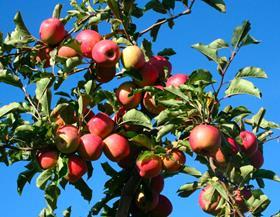
French apple production in southern France escaped storm and hail damage in early August thanks to the localised nature of the storms and effective orchard protection, shippers report.
But the start of the nation’s apple season – heralded by the Royal Gala harvest – was still some two weeks delayed due to a protracted winter and cool spring that slowed down fruit development.
“This will be an historically late season for us,” says Marc Peyres, export manager for French fruit grower-shipper Blue Whale. “It’s the latest season start we’ve had since we started growing Royal Gala in the 1990s.” Yet French growers still anticipate a top-quality apple crop with good colour, and are looking forward to strong international demand. “The European crop is only slightly higher than last year, which was an unusually small crop,” Peyres says. “In western Europe, the harvest is expected to be the second smallest in 10 years, so we should have a favourable global market.”
Smaller than average apple sizes for certain varieties, including Royal Gala, could present shippers with a challenge at the start of the export deal, he adds. “But I think we’ll overcome this and have a good season much like last year for many
varieties.” However, the increased transit time for fruit shipments by sea from Europe to Asia is worrying the French apple sector as the export season approaches.
Reduced vessel speed (slow steaming) and added port stops introduced by container shipping lines to save money are prolonging Europe to south-east Asia fresh fruit journey times by one week or more, according to Peyres. Ad-hoc route changes are also affecting transit times and causing delays to deliveries, he says.
“This creates a lot of problems for fruit supply programmes because it can affect quality and because customers need more stock in case of delay, which increases associated export risks,” Peyres says.
“For some more delicate products, like kiwifruit and summer fruits like nectarines and plums, this increased transit time could kill long-distance overseas business.
“We are really concerned that something announced by the shipping sector as a temporary measure two years ago is now common practice among all shipping lines. I will not be surprised to see a reduction in long-distance business for fruit in terms of volume due to this change in transport.” An increase in seafreight costs to Thailand is also likely to affect French apple shippers this season.
Last year Thailand introduced a new protocol that requires French apples to undergo cold-treatment en-route. The special equipment required to ship the fruit to this market has elevated export costs and increased the risk of exporting to this market.
Meanwhile, tougher import rules in Indonesia and a shorter French crop prevented French apples from being exported there last year. Exporters are in discussions with Indonesian authorities and hope to be able to return to this market this season, Peyres says.
French apple volumes are expected to return to normal this season after a significantly reduced crop last year. “We are back to normal this season so we can easily supply all markets,” Peyres says. “But despite our lower yields last year we managed to supply Asia throughout the season.” —
FRENCH LORRY TAX PLAN FACES DELAY
French transport minister Frédéric Cuvillier has demanded an update on preparations for a new compulsory road toll on lorries – known as écotaxe –that is officially scheduled to start in October, writesPeter Crosskey.
The tax is significant as it would affect all lorries using the taxable roads, including those freighting produce to the UK from across Europe.
Senior management at collection contractor Ecomouv’ were due to meet late last week and were widely expected to recommend a further postponement to January 2014.
According to French press reports, about 10,000 of the country’s 600,000 lorries have been registered over the summer, well short of official expectations.
Ecomouv’ is understood to be ready to ramp up call centre capacity to handle more telephone registrations, but even doubling the administration effort to be able to process 20,000 registrations a day would still require a volume of calls that has yet to materialise.
Registration is needed in order to issue an onboard écotaxe box, a device which communicates with roadside equipment and triggers payments of between €0.08and €0.14 per kilometre on taxable road sections.
While the French government hopes to raise €1.2bn a year from lorry traffic on roads that were previously free to use, businesses in France are resisting a move that could potentially add between five per cent and eight per cent to their transport bills.
Part of the opposition arises from the fact that while hauliers will be able to charge back écotaxe to customers loading the lorries, suppliers face an uphill struggle to recover the additional transport costs from
their clients.
While the French government has been collecting economic data on prices and margins in the food chain for some years now, it has yet to weaken the stranglehold multiple retailers have on the suppliers’ share of the final retail ticket.
The écotaxe roadside equipment has been under live test now for several weeks, yet the real test will
be whether or not it goes live while the current government remains
in power.
Other EU member states are following the French experience closely, with a view to rolling out a similar lorry tax of their own. —



